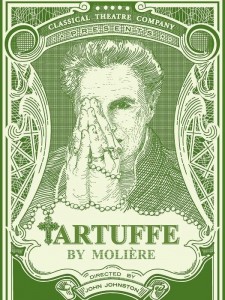The play “Tartuffe”, by Moliere, is a work that was created to show people a flaw in their human nature. There are two characters who portray the main flaw presented in the play.
Both Madame Pernelle and Orgon are blinded to the farces of Tartuffe and must be coaxed into believing the truth. The fact that Orgon and Madame Pernelle are too weak to see the truth is the main driving force throughout the play.
The most obvious weakness shared between Orgon and Madame Pernelle is gullibility. The trait of gullibility can be seen as a family trait as suggested in an essay on “Tartuffe” : “His mother shares his capacity for self-delusion even after Tartuffe has been found out (“We cannot always judge by what we see”)” (Weals).
Orgon believes because Tartuffe claims to be a man of God he should put everything he has into Tartuffe’s hands. He proves how much he believes this after Damis tells him that Tartuffe was flirting with Elmire.
From this accusation Orgon replies to Damis: “I disinherit you; an empty purse / Is all you’ll get from me – except my curse!” (III, vii , 68). Madame Pernelle shows the family trait that she shares with her son when she states: “He’s a fine man, and should be listened to.”(I, i ,44), while speaking of Tartuffe.
Although they share this trait throughout the play, Orgon’s eyes are finally opened at the end of the play while his mother is still held by the farce of Tartuffe.
Although Tartuffe is portrayed as the main character of the play, Orgon is the character who should really be paid attention to the most. As suggested in an essay on “Tartuffe” audiences who concentrate on the character who titles the work may miss the author’s point: “…vitriol and spleen vented on one man suggests that Moliere’s satire of Orgon, nevermind Tartuffe, was steeped in truth.” (Smaje).
Orgon is the character who represents the weakness in human nature. This weakness is shown throughout the play. Orgon is so willing to entrust everything he has into the care of Tartuffe. He places Tartuffe above the well-being of his family.
When he returns from his trip and asks Cleante how the household was while he was gone, Cleante tells him that his wife had been very sick. Orgon’s odd response is, “Ah. And Tartuffe?”.
When he hears that Tartuffe has been eating, sleeping, and generally living well Orgon retorts with another peculiar response, “Poor fellow!” (I, iv , 10).
Orgon demands that Mariane give up Valere and marry Tartuffe. This again shows how Tartuffe has taken over due to Orgon’s weakness.:
That’s wisely said, my Daughter. Say of him then,
That he’s the very worthiest of men,
And that you’re fond of him, and would rejoice
In being his wife, if that should be my choice.
Well?
(II, ii, 15)
This is obviously not what Mariane wants but Orgon continues to demand that she obey him.
Although Madame Pernelle is seen as gullible, she is consistent. At the beginning of the play she is ridicules her family and compares them to Tartuffe. She shows how much she is taken by him in this phrase: “Whatever he reproves deserves reproof. / He’s out to save your souls, and all of you / Must love him, as my son would have you do.” (I, i , 52).
Near the end of the play when Orgon finally admits that he was wrong Madame Pernelle still will not believe Tartuffe is not who he pretends to be. She consistently defends the innocence of Tartuffe when she says: “No, my son, I’ll never bring / My self to think him guilty of such a thing.” (V, iii, 17)
The flaw of weakness is the major driving force in the play. With out this flaw Tartuffe would have no one on which to practice his conniving ways. Both Orgon and Madame Pernelle are crucial characters to make this play work.
Although Tartuffe carries the title of this play, it is well suited to focus more attention on Orgon and Madame Pernelle and their human weakness.
Works Cited
Moliere, Jean-Baptise Poquelin. “Tartuffe.” The Norton Anthology of World Masterpieces. Ed. Maynard Mack. New York: W.W. Norton & Company, 1995. 307 -356.
Smaje, Andrew. “Director’s Notes”. Internet Address: http://www.keighley.ac.uk:80/bpft/shows/dir-note/tartuffe.htm .
Weales, Gerald. “Orgon’s Box”. Internet Address: http://libertynet.org:80/~forum/feb2996/08tartuffe.feb2996.html.
Photo credits: http://www.istos.net.gr:80/html/theater/htm.erga/ergo027.htm .

